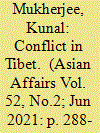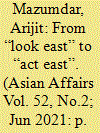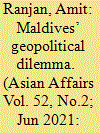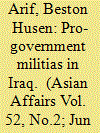|
|
|
Sort Order |
|
|
|
Items / Page
|
|
|
|
|
|
|
| Srl | Item |
| 1 |
ID:
179347


|
|
|
|
|
| Summary/Abstract |
This article looks at the internal and external dimensions of the on-going Tibetan conflict and argues that these two facets of the conflict are intertwined and should not be viewed separately or independent of one another. Internally, the factors which have contributed to the conflict include repressive Chinese state policies such as Han migration from China proper to Tibet, economic development in Tibet as defined by the Chinese state, and the Patriotic Education Campaigns (PEC) to mention just a few. Externally, foreign powers like India and the US have been involved. India, for instance, has provided Tibetan monks and the Dalai Lama with refuge after the Chinese invasion of Tibet in the 1950s. Extensive field trips were undertaken to both India and China from 2015-2019 to carry out the research for this article. In addition to using a range of secondary source material, this article makes use of participant observation as a key research method to further its arguments.
|
|
|
|
|
|
|
|
|
|
|
|
|
|
|
|
| 2 |
ID:
179355


|
|
|
|
|
| Summary/Abstract |
The events of 1978 shaped much of Viet Nam's political and economic environment for more than a decade. After the triumph of the war for national independence in 1975, Viet Nam hoped for a new era of sustained peace and economic development. However, soon after, in 1978, Viet Nam found itself bogged down in another war against the Khmer Rouge to the West, defending against a surprise Chinese invasion to the North and bearing the brunt of economic sanctions from the U.S. and allies. Viet Nam's sole lifeline was economic and military aid from the Soviet bloc. Economic and political isolation crippled the country's economy and continued until Viet Nam launched comprehensive reforms in 1986 and withdrew from Cambodia in 1989. Given the critical importance of the events in 1978 and their consequences, this piece aims to review the happenings, their causes and lessons learned for contemporary diplomacy, particularly for small-to-medium sized countries.
|
|
|
|
|
|
|
|
|
|
|
|
|
|
|
|
| 3 |
ID:
179351


|
|
|
|
|
| Summary/Abstract |
In 1991, India's Prime Minister P.V. Narasimha Rao outlined the ‘Look East' policy, designed to address India's neglect of the Southeast Asian region during the Cold War period. The purpose of the Look East policy initially was to build closer economic and cultural ties with the countries of the region and with ASEAN in particular. The current Modi administration's new ‘Act East' policy has sought to expand these ties to include deeper security cooperation and defense partnerships as well. In addition, the new policy focuses on building ties with countries in the wider Asia-Pacific region, including Australia, New Zealand, Japan, and South Korea. The new policy is more than an exercise in rebranding. The primary goals behind the Act East policy are both to promote India's economic growth and development and respond to China’s rise and expanding influence in the region. However, India needs to be mindful about the challenges associated with the implementation of this policy.
|
|
|
|
|
|
|
|
|
|
|
|
|
|
|
|
| 4 |
ID:
179349


|
|
|
|
|
| Summary/Abstract |
This paper argues that the incipient tensions over the Brahmaputra between India and China has become a considerable threat and cause for concern to the downstream dwellers of India's North East Region (NER), especially Assam and Arunachal Pradesh. It enlarges the term ‘Brahma-hypothesis' and considers Chinese ‘hydro-hegemony' over the Brahmaputra as a ‘national security' threat to India. It also argues that apart from having the occasional Memorandum of Understanding (MoU) with China, India should seek to develop with China and other countries a multilateral diplomatic agreement regarding the management of the Brahmaputra River to secure India’s vital interests at national and regional levels. This is also necessary to minimise the sense of insecurity continuously growing in the minds of the people of the NER.
|
|
|
|
|
|
|
|
|
|
|
|
|
|
|
|
| 5 |
ID:
179352


|
|
|
|
|
| Summary/Abstract |
This article discusses the complicated and developing rivalry between India, China, and the US in the Maldives. It gives a detailed account of the relationships between each of these powers and the Maldives as a small state over recent years, particularly in the economic and military spheres, and in particular looks at the domestic impact of the country's relationship with these large external powers as it attempts to steer the most advantageous course between them.
|
|
|
|
|
|
|
|
|
|
|
|
|
|
|
|
| 6 |
ID:
179350


|
|
|
|
|
| Summary/Abstract |
This interpretive visual report interacts with repertoires of graffitied messages photographed at two university campuses in Hong Kong after skirmishes laced with tear gas and fire between students and riot police had ceased. This work is a response to several graffitied images taken in early 2020 after the campus siege of 2019. It is accompanied by a reference to the reverberations of recent watershed developments that have fundamentally changed Hong Kong society and the modern-day University's mission to establish coalescence amidst the diversity of ideas.
|
|
|
|
|
|
|
|
|
|
|
|
|
|
|
|
| 7 |
ID:
179348


|
|
|
|
|
| Summary/Abstract |
Along with Iraqi security forces, pro-government militias, known as Popular Mobilisation Forces (PMF, also “Hashd al-Shaabi” in Arabic), played a significant role in defeating ISIS. Iraq's engagement with these armed groups during the fight against ISIS empowered and legitimised them within the country. Yet, they often committed human rights violations and were involved in violent activities against the United States embassy, personnel, and military bases. However, since 2014, these groups have been acting as pro-government militias and are legally part of the Iraqi security forces. Yet, some of them have declared loyalty to Iran and act as proxy forces for Tehran. This article argues that pro-government militias in post-ISIS Iraq have negative impacts on security and human rights in the country because most of these groups were previously established based on sectarian factors and proximity to Iran. It also argues that while they are largely regarded as having had an essential role in defeating ISIS, their presence in a post-ISIS Iraq will threaten Iraq's stability.
|
|
|
|
|
|
|
|
|
|
|
|
|
|
|
|
| 8 |
ID:
179353


|
|
|
|
|
| Summary/Abstract |
India's textile industry is among the largest in the world and contributes significantly to India's GDP and economic growth. As the second largest total exporter globally after China with more than 45 million workers, India's textile industry has long been the subject of criticism concerning labour exploitation and environmental damage. Since 2016, nevertheless, Narendra Modi's government has started to take a different yet somewhat perplexing approach to introducing and environmentally friendlier and more sustainable direction in its textile industry. This article aims to comprehend the reasons behind India's new policy arguing that—despite such changes—environmental sustainability has not become India's full concern in the textile sector at the moment. Such a shift was part of India's international market expansion strategy towards the European Union market which had imposed non—tariff import restrictions on India's textile products. This article also shows contradictions and tensions in the government's eco—friendly textile policy concerning its high production costs and India's yet dependence on conventional production systems.
|
|
|
|
|
|
|
|
|
|
|
|
|
|
|
|
| 9 |
ID:
179354


|
|
|
|
|
| Summary/Abstract |
This article analyses the UAE's security-led foreign policy engagement within the Middle East and North Africa (MENA). I have interpreted the UAE's foreign policy strategy as one that employs Joel Migdal's State in Society model, whereby informal networks and communities are primarily utilised for the implementation of foreign policy engagement. In this paper I discuss the justification for this hypothesis, and then illustrate my argument through case studies of the UAE's engagement with Libya, Yemen, and Somalia.
|
|
|
|
|
|
|
|
|
|
|
|
|
|
|
|
| 10 |
ID:
179346


|
|
|
|
|
| Summary/Abstract |
The Afghan Taliban appear to be on the verge of reconstituting the so-called Islamic Emirate of Afghanistan proto-state that was toppled in late 2001 by U.S., coalition and indigenous forces. A series of factors indicate that the Afghan government could implode from within or be swiftly overthrown by the Afghan Taliban unless the United States continuously reinforces Kabul with ample political-military aid. In addition, any future U.S.-led military reengagement would likely amount to a replay of the events of late 2001 or worse, thereby prolonging the war. Lastly, there is little reason to expect that the Afghan Taliban leadership will temper its ideological aspirations, sever ties with designated terrorist groups, or moderate its governing style in return for international recognition or under threat of punitive repercussions. As such, how the United States manages its anticipated withdrawal in the coming months will have major ramifications, and America should prepare for the possibility of an historical recurrence of the collapse of the Afghan government reminiscent of the downfall of the Soviet-sponsored Communist regime in 1992.
|
|
|
|
|
|
|
|
|
|
|
|
|
|
|
|
|
|
|
|
|